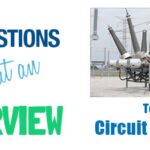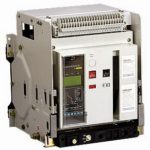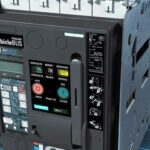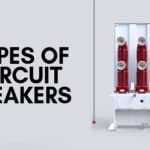16. Out of the following circuit breakers, which one has the lowest voltage range ?
(A) Air-break circuit breaker
(B) Tank type oil circuit breaker
(C) Air-blast circuit breaker
(D) SF6 circuit breaker.
17. Which of the following circuit breaker can be installed on 400 kV line

(A) Tank type oil circuit breaker
(B) Miniature circuit breaker
(C) Vacuum circuit breaker
(D) Air blast circuit breaker.
18. In a vacuum circuit breaker, the vacuum is of the order of
(A) 10mm Hg
(B)10-2mmHg
(C) l0-6 mmHg
(D)10-9mmHg.
19. In modem EHV circuit breakers, the operating time between instant of receiving trip signal and final contact separation is, of the order of
(A) 0.001 sec
(B) 0.015 sec
(C) 0.003 sec
(D) 0.03 sec.
20. In a HRC fuse the time between cut-off and final current zero, is known as
(A) total operating time
(B) arcing time
(C) pre-arcing time
(D) any of the above.
21. Fusing factor for a HRC fuse is
(A) Minimum fusing current / Current rating
(B) Minimum fusing current / Minimum rupturing time
(C) Maximum fusing current / Minimum fusing current
(D) Minimum fusing current / Prospective current of circuit.
22. Which of the following circuit breakers does not use pneumatic operating mechanism
(A) Air blast circuit breaker
(B) SF6 blast circuit breaker
(C) Air break circuit breaker
(D) Bulk-oil circuit breaker.
23. The contact resistance of a circuit breaker is. of the order of
(A) 20 micro ohms ± 10
(B) 20milli ohms ± 10
(C) 20 ohms ± 10
(D) 200 ohms ± 10.
24. The insulation resistance of high voltage circuit breaker is
(A) 1k Ohm
(B) 10 k Ohm
(C) 20 Mega ohms
(D) 2000 Mega ohm.
25. There is definite objection to use of which of the following medium for extinguishing the arc in case of a circuit breaker ?
(A) Air
(B) SF6 gas
(C) Vacuum
(D) Water.
26. In a circuit breaker if the insulation resistance between phase terminal and earthed frame is less than the specified limit, the probable cause could be
(A) moisture
(B) dirty insulation surface
(C) carbon or copper particles sticking to the internal surface
(D) any of the above.
27. If a circuit breaker does not operate on electrical compound, the probable reason could be
(A) spring defective
(B) trip circuit open
(C) trip latch defective
(D) any of the above.
28. The normal frequency rms voltage that appears across the breaker poles after final arc extinction has occurred, is
(A) recovery voltage
(B) re striking voltage
(C) supply voltage
(D) peak voltage.
29. The transient voltage that appears across the contacts at the instant of arc extinction is called
(A) recovery voltage
(B) re striking voltage
(C) supply voltage
(D) peak voltage.
30. In a circuit breaker the active recovery voltage depends upon
(A) power factor
(B) armature reaction
(C) circuit conditions
(D) all of the above.






